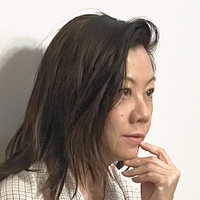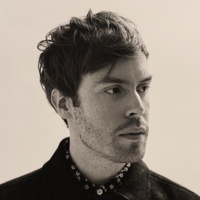On separating anxiety from useful pressure
Prelude
Searows is the indie-folk project of Alec Duckart (he/him), a Pacific Northwest singer-songwriter and guitarist. Duckart’s intimate, hushed, and compelling debut album, Guard Dog, was released independently. His first EP End of the World, came out in November 2023, on Matt Maltese’s new label Last Recordings On Earth.
Conversation
On separating anxiety from useful pressure
Musician Searows discusses learning through listening, the pressures of having an online audience, and always finding new meaning in your work.
As told to Michelle Hyun Kim, 1509 words.
Tags: Music, Creative anxiety, Process, Beginnings, Inspiration.
I know that you entirely self-produced Guard Dog. What made you decide to produce it yourself, and what was your production journey like?
I had a lot of songs written [for Guard Dog] before deciding to make it and produce it myself. I worked with a couple of producers on a couple songs, because I didn’t really think that it was possible to release music that I had produced and was happy with, because I only knew how to use GarageBand, and I only really play the one instrument guitar. So it seemed very daunting, but I didn’t feel like it was my song once someone else had put together the rest of it. For some reason, it was more mine if I made all of the parts and put it all together. It just felt more satisfying, and I felt more proud of it. Also, I’m just so bad at replying to emails where I was talking to producers who live in Los Angeles, so it was just logistically complicated and would stress me out. Once I tried to record on my own in GarageBand, I surprisingly was like, “Okay, I can work with this.”
I wonder, maybe because it was your first project, you felt more precious about it? Or you wanted to be more protective about the music?
That was definitely part of it, too. So much of my motivation to even release music on Spotify was from finding some little audience on TikTok that wanted to hear more music. I didn’t want to stray too far from how the [original] video sounded of just guitar and singing. It’s also just how I wanted it to sound in general.
Since you’ve started to build a following on TikTok, do you feel like your relationship to the platform has changed? Are you more conscious of the audience now?
It definitely changed. I realized that it is very daunting to release a song that I’ve posted on TikTok and that people are excited about. I start really overanalyzing how people will compare the video to the song. I get terrified of people being slightly disappointed in how it sounds.
Sometimes, I feel like there are songs that I’ve written part of that I post on TikTok, and then I’m like, “I have no interest in writing the rest and releasing it. I just wanted to write this little song and post it.” So again, I’ll feel that fear of disappointing people by not releasing something. I feel like the root of it is that I don’t want to disappoint anybody.
Do you think that this pressure from TikTok is mostly negative, or is it also a motivating force in your career?
I think it’s a good pressure. I need to work on my own interpretations of that pressure or my own anxious thoughts about it. I feel like that’s separate from the pressure itself.
Ultimately, I don’t know if I would’ve released or even made an album in the first place if I hadn’t had some of that pressure. It’s something that I’ve said I wanted to do for many years and have never done because I was like, “I’ll do it later.”
You also self-produced your new End of the World EP, and I feel like the production sounds a lot more fleshed out. How do you think your production style has shifted from project to project?
For the first album, I wanted to make it as minimal as possible. I did not have very much confidence in producing things. I didn’t know how to add sounds that created the sound and the feeling that I wanted to have in the song. I didn’t know how to add many layers to a song without it just sounding like a mess of a lot of sounds. I think I made a lot of little demos and random songs in between the album and making the EP. So through that, I’ve been learning how to get closer to the production style and the sounds that I want to make.
Do you have any specific resources you used to learn how to produce? Do you just listen to a lot of stuff, or is it really just experimenting on your own?
I don’t have any other resources that I use to learn. I think it’s mostly just trying things and also listening to other people’s music. I don’t remember exactly, but I saw a video of Adrianne Lenker playing guitar with a paintbrush. I might’ve seen somebody else do it, too, but I learned that adding that kind of playing on top of a regular guitar layer just makes it sound cool. So I put a lot of that in the EP. Also, just noticing little sounds that people add to their songs do so much for the arc of the song, too.
When you released your single “Funny,” you said in the press notes that the song is about the things you say to get yourself out of anxiety. How do you use songwriting to release your anxious thoughts?
It comes up in ways that I don’t even intentionally set out to do. [On the EP] I was writing about random thoughts that I have—silly, anxious things that I think about throughout the day. Instead of trying to make it sound pretty and poetic, I’m just saying them. So in a lot of songs, there’s just the same line repeated for the end of the song or something. It feels very mantra-like.
Do you think your relationships to the songs you’ve written change over time?
They definitely do. Because most songs that I write, I didn’t really necessarily know what I was even trying to say when I wrote them. I’ll write a lot of things that are like, “This sounds pretty, and it just popped into my head, so I’ll put it in a song.” Then after playing it 50 times I’m like, “Oh, that could mean this.” Or it applies in some way to this feeling or experience that I am having now or was having at some other point. So I feel like it’s always evolving.
I find that something about your music really seems to suit the colder months. Since you’re from the Pacific Northwest, I was wondering if you had any thoughts on your music and the weather or climate you grew up in.
Definitely. I feel like the Pacific Northwest and Oregon specifically has so much influence [on my music], just because I love it there and it’s so beautiful. I grew up listening to very stereotypical Pacific Northwest-type music. My parents listened to a lot of it. Like the Decemberists and Sleater-Kinney and people who lived in the Portland area. Bon Iver and Sufjan Stevens, who are both from the Midwest, but they sing about the Pacific Northwest. Sufjan Stevens’ Carie and Lowell, in my mind, is his Oregon album. And the Twilight soundtrack—it’s Washington technically, the trees and the fog—but that’s also very much my taste in music. It definitely seeps into what I write.
Is there anything else besides music or nature that influences you?
Books and animals. I’ve written a lot of references to dogs. A lot of other art, poetry, and music reference dogs too, so I’m probably influenced by it all. Most recently [I wrote about a crow in my song “I have more than enough.”] I’m so interested in how smart crows, and other bird species, are. They make friendships and connections with people. They have these routines and will bring you gifts. Some of them have language, too. That’s just so crazy and cool.
Is it helpful to write about animal relationships? Does it help you observe new things about human relationships?
As humans, we think of ourselves as the only ones who have culture and language and maybe we think of them as just “human things.” But there are other animals that also do those things. I’m also really obsessed with orca whales. They have a similar brain to body ratio that people do, so they do a lot of things that people might not expect done by a sea animal. I feel like [observing animals] makes you think about the things that we do as people that are instinctual, like the way that we care for each other and the way that we communicate with each other. You think so much harder about it when [the same behavior is displayed by] not humans. It provides a whole different perspective when you’re seeing animals do the same things that we do.
Searows Recommends:
Marked for Death by Emma Ruth Rundle (album)
I’m Green by Mali Velasquez (album)
Night Sky with Exit Wounds by Ocean Vuong (poetry book)
Ampersand Revisited by Simeon Berry (poetry book)
Free Willy (1993 film)
- Name
- Searows
- Vocation
- singer, songwriter, producer, guitarist
Some Things
Pagination



